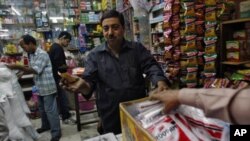In India, the government hopes that its decision to allow foreign retailers into the country will bring in billions of dollars of investment, create millions of jobs and modernize India’s retail sector.
India's Commerce Minister Anand Sharma says the government has built in safeguards to protect farmers and small shopkeepers while allowing the entry of foreign retailers like Walmart and Tesco into the country.
Foreign retailers have been given the green signal to invest up to 51 percent in multi brand retail, such as supermarkets. Foreign companies can now invest up to 100 percent in single brand retailers.
The new foreign superstores will be allowed to set up shop in cities with a population of at least one million. They must invest at least $100 million and half of this would have to be invested in rural infrastructure and refrigerated transport and storage. Thirty percent of their produce would also have to come from small and medium enterprises.
Global retail giants have waited for years for India to open its $ 450 billion domestic retail market, which is still largely dominated by mom and pop stores. But the government hesitated due to fears that the entry of foreign supermarkets will wipe out local livelihoods.
A day after allowing foreign direct investment or FDI in retail, Commerce Minister Anand Sharma tried to calm such concerns.
“This step which we have taken is an investment in the present and the future of this country," he said. "This will help immensely India’s farmers. It will help in creating jobs both in manufacturing as well as in the agro and food processing sectors. It will bring in enormous amounts of FDI into this country to build the infrastructure.”
Over the next three years, Sharma said foreign retailers could help create up to 10 million jobs, many of them in rural areas. He says the establishment of cold storage facilities by these retail chains will improve India’s decrepit infrastructure which results in up to 50 percent losses of fresh produce.
He also says farmers will benefit immensely by getting higher prices. At present they get a fraction of the price paid by consumers due to the presence of several middle men in India’s antiquated retail supply chain.
But the main opposition Bharatiya Janata Party remains unconvinced. A senior BJP leader, Yashwant Sinha says the party will lead a nationwide movement to oppose the entry of global retail giants.
Foreign retailers will wipe out small shopkeepers in the country and only the big players will survive, Sinha argues, warning that unemployment will rise in a big way.
A basket maker speaks on a mobile phone as he waits for customers at a bamboo and cane baskets shop in Hyderabad. (Reuters)
India’s retail sector is the second biggest employer after agriculture.
The Communist Party of India also has misgivings, says its senior leader Sitarm Yechury.
Yechury says the influx of foreign capital in retail trade will be a huge threat to local jobs. It will not increase employment, it will take away livelihoods.
There are also concerns that although the federal government has approved the move, several state governments, ruled by opposition parties, could block the entry of foreign retailers into their states.









